doubt 与 suspect 的用法比较
英语常用同义词及其辨析 English Synonyms D(五)

英语常用同义词辨析English Synonyms D(五)doubt, suspect, distrust这些动词均含“怀疑”之意。
doubt : 普通用词,多指因证据不足或仅凭证据还不能肯定而产生怀疑,多含否定意味。
suspect : 指猜疑、疑心,肯定意味较多。
distrust : 指疑惑、猜疑,不信任。
dove, pigeon这两个名词均表示“鸽”之意。
dove : 指较小品种的鸽,美国称为野鸽。
pigeon : 多指家鸽。
drag, draw, pull, haul, tug, tow, jerk这些动词都有“拖、拉”之意。
drag : 指沿斜坡而上或水平方向缓慢地拖或拉十分沉重的人或物。
作借喻时可指把人硬拉扯过来。
draw : 指将人或物朝出力者的方向拖,不涉及力的大小,含平稳意味,常作借喻用。
pull : 最普通用词,包含本组其它各词的一些意思,可指朝各个方向拉,侧重一时或突然拉动的动作。
haul : 指用力拖或拉,不涉及方向,多作航海用词。
tug : 多指一阵阵地用力拖或拉,但不一定使被拉的人或物移动。
tow : 特指用绳子或链条等拖或拉本身无动力或无法使用自身动力的东西。
jerk : 指快而突然地拉。
draft, outline, diagram, plot, sketch, blueprint这些词既可作动词也可作名词用,作动词时均有“绘制”之意;作名词时都含“草图”之意。
draft : 用作动词时指按准确比例设计或打样;作名词时专指精确的草图或草案。
outline : 主要给出事物要点或轮廓,强调简化了的整体。
diagram : 侧重指用图形、图表等来说明。
plot : 可与draft和diagram换用,但侧重于表示具体的点、面、部分或目标,从而使相互关系以及和整体的关系得以明确。
sketch : 指用图、模型或语言描述来表示某一事物的整体情况。
blueprint : 主要指绘制蓝图或制定纲领或规划。
基于语料库的SUSPECT和DOUBT用法浅议

基于语料库的SUSPECT和DOUBT用法浅议作者:宋仁福来源:《科学大众·教师版》2013年第10期摘要:词汇是英语教学的重要内容之一,其中近义词又是教学的重点和难点,目前各类近义词区分工具书尚难尽如人意,语料库研究方法为近义词辨析提供了新的工具。
本文基于《柯林斯高级英语学习词典》(第五版)光盘中的WordBank,对比研究SUSPECT和DOUBT 的语义搭配及用法,以对英语教学具有一定辅助意义。
关键词:语料库;近义词; suspect doubt中图分类号:G633.41 文献标识码:A 文章编号:1006-3315(2013)10-145-0011.引言近义词是一种普遍的语言现象,在英语中占有很大比例。
英语近义词往往在概念意义上比较接近,但在搭配、语义韵、类联接等方面差异明显。
教师仅凭传统的工具或手段来辨析词汇的异同常常比较片面,难免挂一漏万。
而语料库可以检索出包含某一关键词的海量例句,通过对真实语境的研究,让学习者体会、发现、归纳近义词在搭配、类联接和语义韵等方面的异同。
2.语料收集及工具说明《柯林斯高级英语学习词典》(第五版)共收录11万多英文词汇、短语和释义,是广大英语学习者首选词典之一。
词典释义、例句解释用词简明,读者只需掌握1000-2000个基础词汇,便可轻松查阅。
所有义项均采用整句释义,亲切自然,深入浅出;全部英语语料出自规模为6.5亿词的世界知名语料库(the Bank of English),例句真实、可靠、地道;提供词频、语法、搭配结构和语用等方面的信息,帮助学习者正确使用语言,成功达到交流的目的;62000余例证直接出自语料库,所涉领域极其广泛,反映现代生活的方方面面,让读者在阅读使用过程中身临其实的语境,领略地道的英语。
作者利用词典的“WordBank”功能,分别收集了所有含SUSPECT的例句278句,含DOUBT的例句575句。
在实际的检索中,SUSPECT共出现了288次,原因是SUSPECT在少数句子出现了一次以上。
doubt的用法
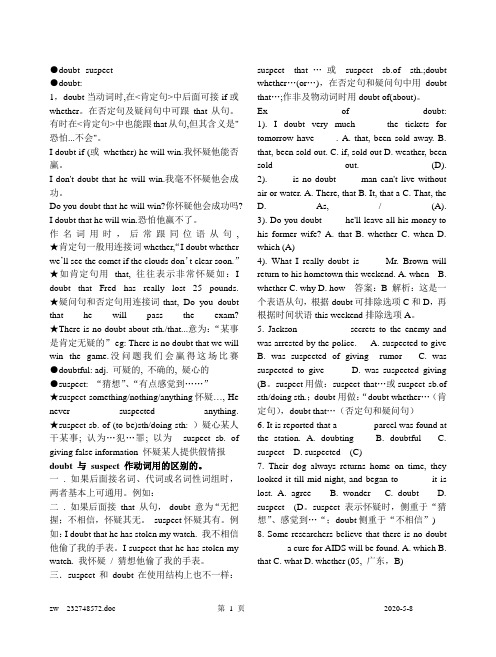
●doubt--suspect●doubt:1,doubt当动词时,在<肯定句>中后面可接if或whether。
在否定句及疑问句中可跟that从句。
有时在<肯定句>中也能跟that从句,但其含义是"恐怕...不会"。
I doubt if (或whether) he will win.我怀疑他能否赢。
I don't doubt that he will win.我毫不怀疑他会成功。
Do you doubt that he will win?你怀疑他会成功吗?I doubt that he will win.恐怕他赢不了。
作名词用时,后常跟同位语从句, ★肯定句一般用连接词whether,“I doubt whether we‟ll see the comet if the clouds don’t clear soon.”★如肯定句用that, 往往表示非常怀疑如:I doubt that Fred has really lost 25 pounds. ★疑问句和否定句用连接词that, Do you doubt that he will pass the exam? ★There is no doubt about sth./that...意为:“某事是肯定无疑的”eg: There is no doubt that we will win the game.没问题我们会赢得这场比赛●doubtful: adj. 可疑的, 不确的, 疑心的●suspect: “猜想”、“有点感觉到……”★suspect something/nothing/anything怀疑…, He never suspected anything. ★suspect sb. of (to be)sth/doing sth: )疑心某人干某事; 认为…犯…罪; 以为suspect sb. of giving false information 怀疑某人提供假情报doubt 与suspect 作动词用的区别的。
doubt的用法全解析
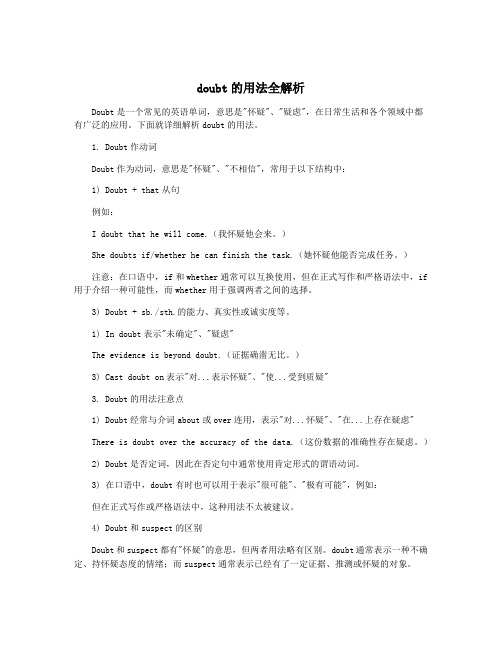
doubt的用法全解析Doubt是一个常见的英语单词,意思是"怀疑"、"疑虑",在日常生活和各个领域中都有广泛的应用。
下面就详细解析doubt的用法。
1. Doubt作动词Doubt作为动词,意思是"怀疑"、"不相信",常用于以下结构中:1) Doubt + that从句例如:I doubt that he will come.(我怀疑他会来。
)She doubts if/whether he can finish the task.(她怀疑他能否完成任务。
)注意:在口语中,if和whether通常可以互换使用,但在正式写作和严格语法中,if 用于介绍一种可能性,而whether用于强调两者之间的选择。
3) Doubt + sb./sth.的能力、真实性或诚实度等。
1) In doubt表示"未确定"、"疑虑"The evidence is beyond doubt.(证据确凿无比。
)3) Cast doubt on表示"对...表示怀疑"、"使...受到质疑"3. Doubt的用法注意点1) Doubt经常与介词about或over连用,表示"对...怀疑"、"在...上存在疑虑"There is doubt over the accuracy of the data.(这份数据的准确性存在疑虑。
)2) Doubt是否定词,因此在否定句中通常使用肯定形式的谓语动词。
3) 在口语中,doubt有时也可以用于表示"很可能"、"极有可能",例如:但在正式写作或严格语法中,这种用法不太被建议。
4) Doubt和suspect的区别Doubt和suspect都有"怀疑"的意思,但两者用法略有区别。
英语常见同义词辨析(23)
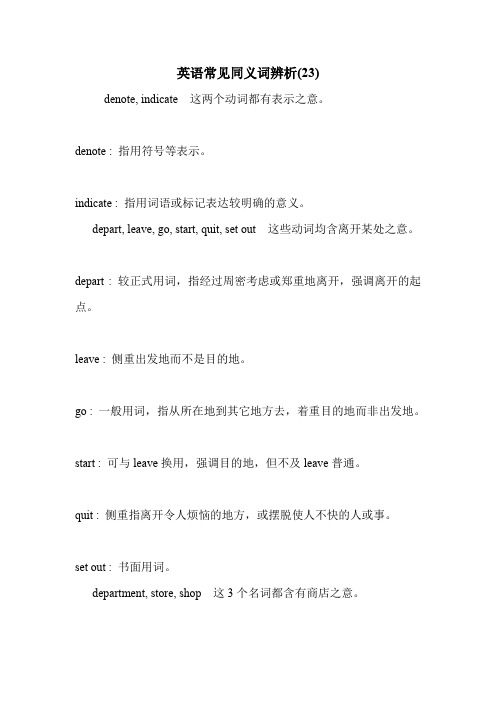
英语常见同义词辨析(23)denote, indicate这两个动词都有表示之意。
denote : 指用符号等表示。
indicate : 指用词语或标记表达较明确的意义。
depart, leave, go, start, quit, set out这些动词均含离开某处之意。
depart : 较正式用词,指经过周密考虑或郑重地离开,强调离开的起点。
leave : 侧重出发地而不是目的地。
go : 一般用词,指从所在地到其它地方去,着重目的地而非出发地。
start : 可与leave换用,强调目的地,但不及leave普通。
quit : 侧重指离开令人烦恼的地方,或摆脱使人不快的人或事。
set out : 书面用词。
department, store, shop这3个名词都含有商店之意。
department : 作商店解时,是美国英语,通常写为department store。
store : 在美国指出售同一类商品的小型商店。
在英国用复数形式表示百货商店。
shop : 指规模较小,出售同一类商品的店铺。
depend, rely这两个动词后跟on(upon),均有依赖、依靠之意。
depend : 侧重指因自身能力不足或缺乏自信心而依靠他人或物给予帮助或支持。
rely : 通常包含着以前的经验证明对方是能依赖的意思。
descend, drop, fall, sink这些动词都表示落下,下降之意。
descend : 通常指沿斜线或斜坡下降。
drop : 指物体从一定高度落下。
fall与drop同义,指突然或猛烈地降落,但fall也可指任何下落,同高度或形式无关。
sink : 指在空气或水中垂直下降、下沉。
desire, wish, hope, expect, want, long这些动词都有希望之意。
desire : 语气较正式庄重,着重渴望的力量与热切,常含有强烈的意图和目的。
wish : 语气较弱,多指难于实现或不可能实现的愿望。
张青英语课堂:英语狂人张青老师教你超级句型
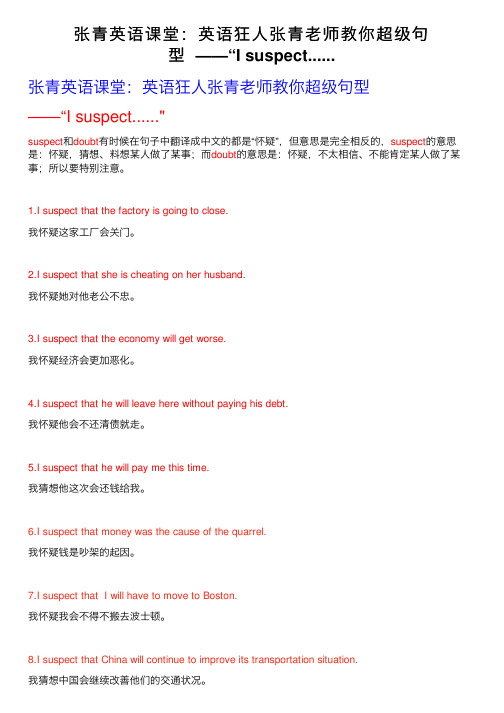
张青英语课堂:英语狂⼈张青⽼师教你超级句型 ——“I suspect......张青英语课堂:英语狂⼈张青⽼师教你超级句型——“I suspect......"suspect和doubt有时候在句⼦中翻译成中⽂的都是“怀疑”,但意思是完全相反的,suspect的意思是:怀疑,猜想、料想某⼈做了某事;⽽doubt的意思是:怀疑,不太相信、不能肯定某⼈做了某事;所以要特别注意。
1.I suspect that the factory is going to close.我怀疑这家⼯⼚会关门。
2.I suspect that she is cheating on her husband.我怀疑她对他⽼公不忠。
3.I suspect that the economy will get worse.我怀疑经济会更加恶化。
4.I suspect that he will leave here without paying his debt.我怀疑他会不还清债就⾛。
5.I suspect that he will pay me this time.我猜想他这次会还钱给我。
6.I suspect that money was the cause of the quarrel.我怀疑钱是吵架的起因。
7.I suspect that I will have to move to Boston.我怀疑我会不得不搬去波⼠顿。
8.I suspect that China will continue to improve its transportation situation.我猜想中国会继续改善他们的交通状况。
9.I suspect that she has good news.我猜她有个好消息。
10.I suspect that he cheated on the examination.我怀疑他在考试中作弊了。
doubt的用法全解析

doubt的用法全解析今天给大家带来了毫无疑问:doubt的用法全解析,我们一起来学习吧,下面就和大家分享,来欣赏一下吧。
毫无疑问:doubt的用法全解析When in doubt, go to the library.——J.K. Rowling《Harry Potter and the Chamber of Secrets》有疑问的时候,去图书馆。
——J·K·罗琳《哈利波特与密室》一、下面我们来看看doubt有几种含义n.疑惑,疑问,不确定,不相信[U,C]There is no doubt but that he will win the election.毫无疑问,他将在竞选中获胜。
v.1.对…无把握,不能肯定,认为…未必可能[I]They have never doubted of success.他们对成功从未怀疑过。
2.怀疑,不相信,不信任[T]I doubt whether Tom has taken my watch.我怀疑汤姆是否拿了我的手表。
3.【古】恐怕[I,T]二、词义辨析:doubt(名词词义“怀疑” )还有哪些近义词呢?doubt, supicion, distrust, uncertainty这些名词均有“怀疑”之意。
doubt指对事物的真、假有怀疑。
supicion语气较强,指对某人做某事的目的、意图有怀疑,或认为某人做错事,但无确凿证据而产生怀疑。
distrust一般用词,泛指对某人某事不信任而感到怀疑。
uncertainty侧重指对某事或选择等需作决定时的迟疑不决。
三、词义辨析:doubt(动词词义“怀疑”)还有哪些近义词呢?doubt, suspect, distrust这些动词均含“怀疑”之意。
doubt普通用词,多指因证据不足或仅凭证据还不能肯定而产生怀疑,多含否定意味。
suspect指猜疑、疑心,肯定意味较多。
distrust指疑惑、猜疑,不信任。
1996年考研英语真题阅读理解部分答案详解翻译

1996年考研英语真题阅读理解部分答案详解翻译第一篇(1) tight-lipped(a.)沉默寡言的,出言谨慎的(2) psychology(n.)心理学(3) blueprint(n.)蓝图,详细的计划,方案(4) likewise(adv.)同样地,照样地;-wise 后缀,表示“样子”,“位置”或“状态”,如:clockwise(顺时针方向地), lengthwise(纵向地,竖着地)(5) account(n.)叙述,描述(6) routine(n.)固定而有规则的事,常规(7) reference(n.)证明文书, 介绍信,推荐人(8) sketch(n.)概述,概要,梗概(9) secure(vt.)~sth. (for sb. /sth.)(尤指经过努力)获得,取得,实现;如:He secured a place for himself at law school. (他在法学院取得了学籍)。
~sth. (against/from sth.)使某事物安全,保护; 如:to secure a property against intruders (保护房产以免外人闯入)出言谨慎的年长者过去总说:“重要的不是在这个世界上你想要什么,而是你得到了什么。
”(长难句①)心理学教导人们,如果你知道自己需要什么、并且要求合理,你就能得到它。
你可以在头脑里勾画出愿望的蓝图,如同设计房屋的蓝图一样。
(长难句②)而我们每个人在日常生活中都在不停地勾画着这样的愿望蓝图。
比方说,想请朋友吃晚餐,我们就会筹划菜谱、列购物单、决定先煮什么菜等,这样的筹划对于举行任何形式的宴请都是必不可少的。
同样,如果你想找一份工作,那就拿一张纸,写一份对自我的简单描述吧。
(佳句①)为找工作制订计划蓝图时,要从你自己开始,因为只有当确切知道你可以提供什么服务时,你才能明智地筹划到哪儿去推销它们。
对自我的描述实际上是对你的职业生涯的简介,它应包括教育背景、经验和证明材料。
怀疑的英文形容词

怀疑的英文形容词作动词时,因为都有”怀疑“的意思,doubt 和suspect 才有机会相聚,但实际上它们是不同性质的怀疑,因为有的时候你可能会怀疑事情不是真的,有的时候你又可能怀疑事情是真的,那么怎么合理使用doubt 和suspect 呢?一、doubt作动词时,doubt 的英文解释是:to feel uncertain about sth; to feel that sth is not true, will probably not happen, etc.由此可见,doubt 表示的是一种不确定性,指不确定或不相信某事的真实性,意为“怀疑,不确定”,不用进行时,例如:I doubt whether I can finish the work on time.我怀疑我是否能按时完成这项工作。
They had begun to doubt that it could be done.他们开始怀疑这件事是否能办到。
She began to doubt everything he said.她开始怀疑他所说的一切。
二、suspect作动词时,suspect 的英语解释是:to have an idea that sth is probably trueor likely to happen, especially sth bad, but without having definite proof由此可见,suspect 指的是有疑问,觉得某事有发生的可能性,尤其是坏的事情,意为“猜想,怀疑”,不用进行时,例如:I suspect he cheats the taxman.我怀疑他欺骗了税务人员。
I don't really know how she got the job, but I suspect her mother's got contacts. 我真的不知道她是怎么得到这份工作的,但我怀疑她母亲有熟人。
关于doubt 与 suspect的词义辨析
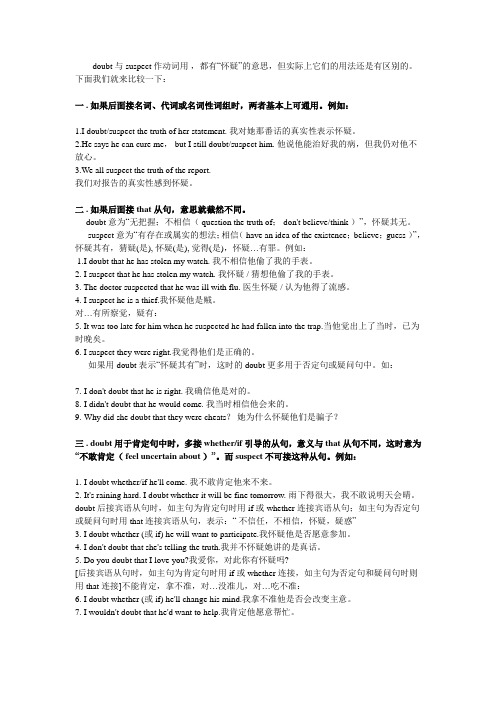
doubt 与 suspect 作动词用,都有“怀疑”的意思,但实际上它们的用法还是有区别的。
下面我们就来比较一下:一 . 如果后面接名词、代词或名词性词组时,两者基本上可通用。
例如:1.I doubt/suspect the truth of her statement. 我对她那番话的真实性表示怀疑。
2.He says he can cure me, but I still doubt/suspect him. 他说他能治好我的病,但我仍对他不放心。
3.We all suspect the truth of the report.我们对报告的真实性感到怀疑。
二 . 如果后面接 that 从句,意思就截然不同。
doubt 意为“无把握;不相信( question the truth of; don't believe/think )”,怀疑其无。
suspect 意为“有存在或属实的想法;相信( have an idea of the existence; believe; guess )”,怀疑其有,猜疑(是), 怀疑(是), 觉得(是),怀疑…有罪。
例如:1.I doubt that he has stolen my watch. 我不相信他偷了我的手表。
2. I suspect that he has stolen my watch. 我怀疑 / 猜想他偷了我的手表。
3. The doctor suspected that he was ill with flu. 医生怀疑 / 认为他得了流感。
4. I suspect he is a thief.我怀疑他是贼。
对…有所察觉,疑有:5. It was too late for him when he suspected he had fallen into the trap.当他觉出上了当时,已为时晚矣。
6. I suspect they were right.我觉得他们是正确的。
suspect的用法总结

suspect的用法总结一、suspect的基本定义和用法suspect(动词)是一个非常常见的英语词汇,它有多种用法和含义。
在本文中,我们将对该词进行全面总结。
1. suspect作为及物动词,表示怀疑或不信任。
例如:- The detective suspects him of stealing the diamonds.(这名侦探怀疑他偷了钻石。
)- I suspect that he's lying to us.(我怀疑他在撒谎。
)2. suspect作为不及物动词,表示怀疑或有可疑之处。
例如:- The police suspect the man is involved in the crime.(警方怀疑这个男人涉案。
)- She suspected that her husband was cheating on her.(她怀疑丈夫对她不忠。
)3. suspect也可以用来表示推测或认为可能性较大。
例如:- I suspect it will rain tomorrow.(我觉得明天很可能会下雨。
)- He suspects she might have forgotten about the meeting.(他认为她可能忘记了开会的事情。
)二、suspect与其他动词的区别和搭配1. suspect与doubt的区别情感色彩:suspect带有更强烈的负面情感,通常暗指某人可能有错误行为;而doubt则更多指对某事的怀疑,不确定。
用法搭配:suspect通常与“of”或“in”连用,表示怀疑某人在某方面有问题;而doubt则可结合不定式来表示怀疑某人的能力、诚实等。
2. suspect与believe的区别表示程度:suspect相对于believe更为弱化,指充满怀疑和不确定性;而believe意味着有一定证据支持并较为确信。
叙述语气:suspect可用于第一人称陈述推测,如“I suspect…”;而believe用于陈述自己持有的信念。
高考词汇suspect和doubt的区别

suspect和doubt的区别一.suspectv.怀疑, 猜疑, 疑心I suspected her motives.我怀疑她的动机。
suspect sb to beI suspect him to be ill .我猜想他病了.I suspect him to be a spy.我怀疑他是个jiandie。
suspect sb of doing/nI suspect him of stealing the car.suspect sb of giving false information怀疑某人提供假情报suspect sb of a crime怀疑某人犯罪suspect that...I suspect that his girlfriend hide her true feelings. We suspect they'll be a little late我们揣想他们会晚来一会儿。
suspicion n.猜疑, 怀疑suspicious adj.可疑的, 引起怀疑的Cats are suspicious of human beings.suspect表示一种肯定的语义, doubt 表示一种否定的语义doubt vt.怀疑, 不信, 拿不准(用that, 往往表示非常怀疑)I doubt the truth of it.我怀疑它的真实性。
I doubt that he will come.我看他不见得会来。
I doubt whether [if] he is at home.我看他不一定在家。
I do not doubt (but) that he can recite it.我相信他能把它背下来。
Can you doubt that he will win?你不相信他会获胜吗?I doubt what he said.我不相信他说的话。
doubtful adj.怀疑的;不信任的It is doubtful that he will come.doubtable adj.可疑的, 令人怀疑的。
陈曦初 笔记总结

这是我上GRE强化班,陈曦初老师在课上讲解的有关词汇的用法和词根的总结,顺序比较凌乱,可能略有遗漏(不小心睡着的情况也是有发生的),如果哪位好心人看到那么请帮我补充,thxGRE词汇的记忆关键在逻辑上的正负和含义的类属,一定要区分,那些词是正向的,哪些是负向的,区分骂和猛骂,夸和猛夸GRE的词根记忆法词根:本意前缀:性质、方向和特征后缀:词性词根词缀的演变:发音比写法重要,读着像或者写着像,字母顺序的错位词根记忆法的意义在于,用熟词记忆词根,用词根记忆新词1.Suspect和doubt都表示怀疑,suspect表示怀疑为真,doubt表示怀疑其为假2.-spect-Inspect 向里看——》v检查Respect 回头看,很恭敬带有崇拜的感觉——》n v尊敬Expect 希望+预料——》v期望Spectator 看得人——》v旁观者specify 看,就是那个——》v指定special 看——》区分——》n特使特别的introspection 往自己里面看——》自省perspicuous 往前看——》明察秋毫的 con cor col 都表示together4.ab(op ap ob)开头表消极正——》负负——》消极5.un表示否定6.psy- 从think 演变而来,表示与想法有关的,后演化为有关心理的7. –volve 从wheel演化而来,轮子——》转evolve 向外转——》v进化involve 向里转——》v包含revolution 从新转——》n革命8.dis-分开如果原有分开的意思,依然表示分开,如果没分开则分开9.-cip- see——》理解——》scienceDiscipline 分开来理解——》学科10. autonomy(自制) 和autocracy(独裁)Auto- 自行-nomy 统治-cracy 统治11.astr-(star) 星星Astronomy 天文学Astrology 占星术-nomy 学科-ology 学科11.alt-(tall)高altitude12.arm-(Mars)13.-ed ——》xxable=able to be xxed14.in- 形容词为否定,动词为向内15.-dict- 说——》做16.Prometheus——》pro- 前Epimetheus ——》epi- 后Prometheus和Epimetheus都是Titan族,与诸神之战的时候Prometheus知道打不过Zeus,告诉Epimetheus投降了,但是Atlas依然与Zeus对抗最后失败了,zeus让atlas托着地球,atlas(地球仪),Zeus娶了Atlas的女儿Maia(May)生了一个女儿叫Hermas(爱马仕)。
doubt的用法全解析

doubt的用法全解析今天给大家带来了毫无疑问:doubt的用法全解析,我们一起来学习吧,下面就和大家分享,来欣赏一下吧。
毫无疑问:doubt的用法全解析When in doubt, go to the library.——J.K. Rowling《Harry Potter and the Chamber of Secrets》有疑问的时候,去图书馆。
——J·K·罗琳《哈利波特与密室》一、下面我们来看看doubt有几种含义n.疑惑,疑问,不确定,不相信[U,C]There is no doubt but that he will win the election.毫无疑问,他将在竞选中获胜。
v.1.对…无把握,不能肯定,认为…未必可能[I]They have never doubted of success.他们对成功从未怀疑过。
2.怀疑,不相信,不信任[T]I doubt whether Tom has taken my watch.我怀疑汤姆是否拿了我的手表。
3.【古】恐怕[I,T]二、词义辨析:doubt(名词词义“怀疑” )还有哪些近义词呢?doubt, supicion, distrust, uncertainty这些名词均有“怀疑”之意。
doubt指对事物的真、假有怀疑。
supicion语气较强,指对某人做某事的目的、意图有怀疑,或认为某人做错事,但无确凿证据而产生怀疑。
distrust一般用词,泛指对某人某事不信任而感到怀疑。
uncertainty侧重指对某事或选择等需作决定时的迟疑不决。
三、词义辨析:doubt(动词词义“怀疑”)还有哪些近义词呢?doubt, suspect, distrust这些动词均含“怀疑”之意。
doubt普通用词,多指因证据不足或仅凭证据还不能肯定而产生怀疑,多含否定意味。
suspect指猜疑、疑心,肯定意味较多。
distrust指疑惑、猜疑,不信任。
表示怀疑的单词

表示怀疑的单词
一、doubt [daʊt],动词/名词。
1. 动词用法示例。
- I doubt his honesty.(我怀疑他的诚实。
)
2. 名词用法示例。
- There is some doubt about his story.(对他的说法存在一些怀疑。
)
二、suspect [səˈspekt],动词;[ˈsʌspekt],名词/形容词。
1. 动词用法示例。
- I suspect that he is lying.(我怀疑他在说谎。
)
2. 名词用法示例。
- The suspect was arrested last night.(嫌疑犯昨晚被逮捕了。
)
3. 形容词用法示例。
- His suspect behavior made us all cautious.(他可疑的行为让我们都很谨慎。
)
三、question [ˈkwestʃən],动词/名词。
1. 动词用法示例。
- I question the truth of what he said.(我对他所说的真实性表示怀疑。
)
2. 名词用法示例。
- There are many questions about his explanation.(关于他的解释有很多疑问。
)。
怀疑的英语形容词
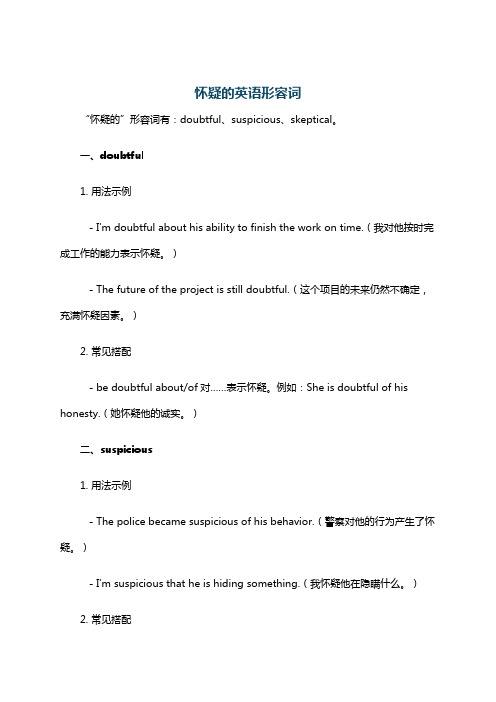
怀疑的英语形容词“怀疑的”形容词有:doubtful、suspicious、skeptical。
一、doubtful1. 用法示例- I'm doubtful about his ability to finish the work on time.(我对他按时完成工作的能力表示怀疑。
)- The future of the project is still doubtful.(这个项目的未来仍然不确定,充满怀疑因素。
)2. 常见搭配- be doubtful about/of对……表示怀疑。
例如:She is doubtful of his honesty.(她怀疑他的诚实。
)二、suspicious1. 用法示例- The police became suspicious of his behavior.(警察对他的行为产生了怀疑。
)- I'm suspicious that he is hiding something.(我怀疑他在隐瞒什么。
)2. 常见搭配- be suspicious of/about对……怀疑。
例如:They are suspicious about the strange man.(他们对那个陌生男子感到怀疑。
)三、skeptical1. 用法示例- Many scientists are skeptical of this theory.(许多科学家对这个理论持怀疑态度。
)- She was skeptical about the new product's effectiveness.(她对新产品的功效表示怀疑。
)2. 常见搭配- be skeptical of/about对……怀疑。
例如:He is always skeptical about new ideas.(他总是对新想法持怀疑态度。
)。
doubt的用法详解

doubt的用法详解doubt的准确意思是“对.表示疑惑”,在肯定句中常与if或whether搭配使用,意思是“我对xxxx是否发生表示疑惑”,“我对xxxx是对的还是错的表示疑惑”等等.而用doubt that时,后面要接的是将要发生或已经发生的一个事实,表示我对这件事的怀疑.而且doubt that通常用在否定句里,表示“恐怕、不会”的意思.用于肯定句的话,还是doubt if/whether更符合习惯.I doubt if she will change her mind.意思是我怀疑她是不是真的会改变想法.I doubt that she will change her mind.意思是我恐怕她不会改变想法.又例如:I doubt if/whether he will win.我怀疑他能否赢.I don't doubt that he will win.我不怀疑他会赢.doubt和suspect的意思上差不多.doubt更口语化.suspect更书面化、正规化,而且一般就直接写suspect sth,没有suspect if/whether这样的搭配.suspect that 倒是比较常用,比如:I suspect that she told a lie. 我怀疑她说谎.作为对比,I doubt that she told a lie意思是我觉得她没说谎,不过貌似一般比较少这么说.1 doubt的用法解答: 1,doubt当动词时,在<肯定句>中后面可接if或whether。
在否定句及疑问句中可跟that从句。
有时在<肯定句>中也能跟that从句,但其含义是"恐怕...不会"。
I doubt if (或 whether) he will win.我怀疑他能否赢。
I don''t doubt that he will win.我毫不怀疑他会成功。
suspect的同义词是什么

suspect的同义词是什么suspect表使惊奇; 突袭的意思,那么你知道suspect的同义词有哪些吗?接下来小编为大家整理了suspect的同义词,希望对你有帮助哦!suspect的同义词辨析:doubt, suspect, distrust这些动词均含"怀疑"之意。
doubt :普通用词,多指因证据不足或仅凭证据还不能肯定而产生怀疑,多含否定意味。
suspect :指猜疑、疑心,肯定意味较多。
distrust :指疑惑、猜疑,不信任。
suspect的例句:1. Investigators say nearly $100,000 was wired into the suspect's bank accounts.调查人员说有近10万美元汇入了嫌疑人的银行账户。
2. Do women really share such stupid jokes? We suspect not.女人们真的会觉得如此愚蠢的笑话好笑吗?我们想不会。
3. I suspect he isn't altogether unhappy about my absence.我猜想他对我的缺席并没有感到很不高兴。
4. She has been acclaimed for the TV drama "Prime Suspect"她凭借电视剧《头号嫌疑犯》而受到好评。
5. She did not suspect that his interest was just a passing fancy.她相信这不过是他一时兴起。
6. I strongly suspect that most ordinary people would agree with me.我坚定地认为绝大部分老百姓会赞同我的观点。
7. I suspect this book will have the widest appeal of all.我猜想这本书会引起大家最广泛的兴趣。
- 1、下载文档前请自行甄别文档内容的完整性,平台不提供额外的编辑、内容补充、找答案等附加服务。
- 2、"仅部分预览"的文档,不可在线预览部分如存在完整性等问题,可反馈申请退款(可完整预览的文档不适用该条件!)。
- 3、如文档侵犯您的权益,请联系客服反馈,我们会尽快为您处理(人工客服工作时间:9:00-18:30)。
doubt 与suspect 的用法比较
doubt 与suspect 作动词用,都有“怀疑”的意思,但实际上它们的用法还是有区别的。
下面我们就来比较一下:
一. 如果后面接名词、代词或名词性词组时,两者基本上可通用。
例如:
I doubt/suspect the truth of her statement. 我对她那番话的真实性表示怀疑。
He says he can cure me,but I still doubt/suspect him. 他说他能治好我的病,但我仍对他不放心。
二. 如果后面接that 从句,意思就截然不同。
doubt 意为“无把握;不相信(question the truth of;don't believe/think )”,怀疑其无。
suspect 意为“有存在或属实的想法;相信(have an idea of the existence;believe;guess )”,怀疑其有。
例如:
I doubt that he has stolen my watch. 我不相信他偷了我的手表。
I suspect that he has stolen my watch. 我怀疑/ 猜想他偷了我的手表。
The doctor suspected that he was ill with flu. 医生怀疑/ 认为他得了流感。
这时doubt 更多用于否定句或疑问句中。
如:
I don't doubt that he is right. 我确信他是对的。
I didn't doubt that he would come. 我当时相信他会来的。
Why did she doubt that they were cheats?她为什么怀疑他们是骗子?
三. doubt 用于肯定句中时,多接whether/if 引导的从句,意义与that 从句不同,这时意为“不敢肯定(feel uncertain about )”。
而suspect 不可接这种从句。
例如:
I doubt whether/if he'll come. 我不敢肯定他来不来。
It's raining hard. I doubt whether it will be fine tomorrow. 雨下得很大,我不敢说明天会晴。
四. 其他搭配。
doubt 可作不及物动词,用于doubt of sth;suspect 用于suspect sth to be,suspect sb of (doing)sth . be suspicious of sth. = be doubtful of 例如:
She never doubted of his success. 她从不怀疑他的成功。
I suspected him to be the spy. 我认为他就是那个间谋。
What made you suspect her of having taken the money?你凭什么怀疑钱是她偷的?
involve用法
及物动词vt. [W]
1.使卷入,连累;牵涉[(+in/with)]
That's no concern of mine. I'm not involved. 那与我无关,我未卷入。
Don't involve me in your quarrel! 不要把我牵扯进你们的争吵中!
2.需要,包含,意味着[(+in)][+v-ing]
His work involves occasional journeys. 他的工作偶尔需要出差旅行。
3.使专注,使忙于[(+in)]
He was involved in writing his doctoral dissertation. 他在聚精会神地写他的博士论文。
另外:
This is indeed an involved sentence.这真是个复杂难懂的句子。
由动词involve演化而来的形容词involved,放在名词前和名词后有不同的含义。
放在名词后使用,大多是这个词的本意“牵扯进来的、有关的、卷入的”;放在名词前使用,意思大多是“复杂的、不易懂的、难于解开的”例句:
The plot of the play has been criticized as being too involved.剧情节被批评为过分纠缠不清。
One of the companies involved is an SOE (state-owned enterprise).
牵扯到的公司中有一家是国企。
(involved另一个含义的用法)
Concerned, concerning, regarding, regards
Richard was called in by the police to answer questions ______ disappearance of Thomas Ripley, whose relatives were so _____ his present situation.
A concerning; concerning about
B concerned; worrying about
C with regards to; concerned about
D regarding; concerned about
这个应该选D。
警方把理查德召来,询问了一些关于托马斯失踪案的问题。
托马斯的亲属们很担心托马斯目前的处境。
concerning,regarding 是同义词,都是“关于”的意思。
concerned它的意思是“关注,担心”。
regarding, with regard to, as regards, in regard to 全都是表示“关于”,with regard to里面的“regard” 没有s。
As regards the people below them they are tigers.对于下面的百姓,他们是老虎。
With regard to housework, my mother always argues with my father.
With regard to the money, we'd better be careful.
a country's laws in regard to human rights. 一个国家关于人权的法律
里面这个regarding,你也可以换成as regards 或是with regard to。
但是记住with regard to 的"regard" 不带s
arrange 在用法上应注意以下几点:
1. 用作及物动词表示“安排”“准备”时,其后通常接事情,而不接具体的人或东西;若接具体的人或东西则需后接介词for,如以下两例中的for不宜省去:
We’ll arrange for an experienced te acher. 我们将安排一位有经验的教师。
I’ve arranged for a taxi. 我已安排好了一辆计程车。
2. 后接事情作宾语时,其后接不接介词for均可(在现代英语中以不接为多见):
Would you like to arrange (for) a personal interview? 你希望安排一次个别接见吗?
3. 正因为表示“安排”时不能直接跟某人作宾语,所以要表示汉语的“安排某人做某事”,英语习惯上不说arrange sb to do sth,而说arrange for sb to do sth:
I’ve arranged for Mary to meet you at the airport. 我已经安排玛丽去机场接你。
类似地,英语不说hope sb to do sth,而说hope for sb to do sth,不说wait sb to do sth,而说wait for sb do sth,不说long sb to do sth,而说long for sb to do sth等。
另外还有,英语习惯上不说demand sb to do sth,而说demand of sb to do sth。
4. 其后可接that引导的宾语从句,从句谓语通常用虚拟语气,但有时也可用将来时态:They arranged that the meeting (should) be put off to Saturday. 他们安排把会议推迟到星期六。
I’ve arranged that one of our representatives will meet you at the airport. 我已安排好派一个代表到机场接你。
比较同义句:I’ve arranged for him to attend the meeting.=I’ve arranged that he (should) attend the meeting. 我已安排他去参加会议。
5. 其后习惯上不接双宾语,如“请给我们安排一次与工人的会见”不能译为:Please arrange us。
